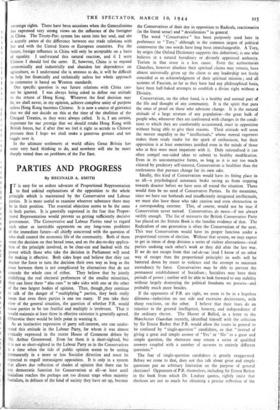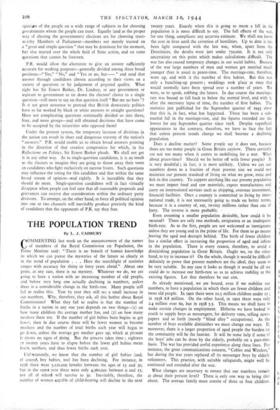PARTIES AND PROGRESS
By REGINALD A. SMITH
IT is easy for an ardent advocate of Proportional Representation to find unkind explanations of the opposition to the whole principle which is maintained by the Conservative and Labour parties. It is more useful to examine whatever substance there may be in their position. The essential objection seems to be the same in both parties. It is generally expressed in the fear that Propor- tional Representation would prevent us getting sufficiently decisive government. The Conservative and Labour Parties tend to regard each other as inevitable opponents on any long-term problems of the immediate future—all chiefly concerned with the question of who shall control the economic life of the community. Both of them want the decision on that broad issue, and on the day-to-day applica- tion of the principle involved, to be clear-cut and backed with the power which those who take the decision in Parliament will need for making it effective. Both sides hope and believe that they can muster the force to turn the decision their own way so long as the issue between them is not complicated by alternatives that do not concede the whole case of either. They believe that by jointly stultifying the real electoral preferences of the smaller minorities, they can force these "also tans" to take sides with one or the other of the two largest bodies of opinion. Thus, though ,they continue to talk of the danger of "multiplying" parties, they both really mean that even three parties is one too many. If you take their view of the general situation, the question of whether P.R. would cause parties to be too fruitful and multiply is irrelevant. That it would maintain at least three in effective existence is generally agreed. Otherwise there would be little point in wanting it As an instinctive expression of party self-interest, one can under- stand this attitude in the Labour Party, for whom it was almost cynically expressed in the recent House of Commons debate by Mr. Arthur Greenwood. Even for them it is short-sighted, but it is not so short-sighted in the Labour Party as in the Conservatives at a time when the tide of public opinion seems to be setting permanently in a more or less Socialist direction and must be expected to engulf intransigent opposition. It is only in a system that allows due reflection of shades of opinion that there can be any democratic function for Conservatism at all—at least until Socialism reaches the perhaps not too distant stage when majority Socialists, in defence of the kind of society they have set up, become
the Conservatives of their day in opposition to Radicals, reactionaries (in the literal sense) and " deviationists " in general.
The word " Conservative " has been purposely used here in preference to "Tory," although in the common jargon of political controversy the two words have long been interchangeable. A Tory, by origin (the Oxford Dictionary supports this definition), is one who believes in a natural hereditary or divinely appointed authority. Torism in that sense is a lost cause., Even the authoritarian Churches, however absolute their spiritual claims may remain, have almost universally given up the claim to any leadership not freely conceded as an acknowledgment of their spiritual mission ; and all systems of Fascism, so far as they have had any philosophical basis, have been half-baked attempts to establish a divine right without a Divinity.
Conservatism, on the other hand, is a healthy and normal part of the life and thought of any community. It is the spirit that puts the onus of proof on those who advocate change. It is the natural attitude of a large stratum of any population—the great bulk of people who, whenever they are confronted with changes in the condi- tions to which they are comfortably accustomed, react in opposition without being able to give their reasons. Their attitude will seem the merest stupidity to the " intellectuals," whose mental eagerness makes them ready tinder for the spark of enthusiasm, but their opposition is at least sometimes justified even in the minds of those who at first were most impatient with it. Duly rationalised it can often compel one-sided ideas to submit to healthy modification. Even in its unconstructive forms, so long as it is not too much vitiated by predatory self-interest, Conservatism is healthier than the restlessness that pursues change for its own sake.
Ideally, this kind of Conservatism would have its fitting place in us all—a psychological automatic brake saving us from stepping towards disaster before we have seen all round the situation. There would then be no need of Conservative Parties. In the meantime, since we have our hotheads and insufficiently integrated intellectuals, we must also have those who take caution and even obstruction to a corresponding extreme. This, of course, would not be true if Conservatism never moved. Conservatives do move—if not always swiftly enough. The list of measures the British Conservative Party has placed on the Statute Book is the familiar evidence of that. The Radicalism of one generation is often the Conservatism of the next. This true Conservatism would have its proper function under a proportional system of election. Without that system, we may expect
to get in times of deep division a series of violent alternations—rival parties undoing each other's work as they did after the last war.
If we do not escape from that cul-de-sac (and I know of no other way of escape than the proportional principle) its walls will be battered down by resort to violence and the attempt to maintain ascendancy by force. Conservatives may be able to prevent the permanent establishment of Socialism ; Socialists may have their periods of power ; neither will be able to look forward to any stability without largely destroying the political freedoms we possess—and probably much more besides.
If the opponents of P.R. are right, we seem to be in a hopeless dilemma—indecision on one side and excessive decisiveness, with sharp reactions, on the other. I believe that their fears do an injustice to the general intelligence, honesty, and independence of the ordinary elector. The Master of Balliol, in a letter to the Manchester Guardian recently, identified himself with the criticism by Sir Ernest Barker that P.R. would allow the issues in general to be confused by " single-question " candidates, so that "instead of giving a great and simple answer of ' Yes ' or 'No' to a great and simple question, the electorate may return a series of qualified answers coupled with a number of answers to entirely different questions."
The fear of single-question candidates is greatly exaggerated. Before we come to that, does not this talk about great and simple - questions put an arbitrary limitation on the purpose of general elections? Opponents of P.R. themselves, including Sir Ernest Barker in the book from which Dr. Lindsay quotes, rightly insist that elections are not so much for obtaining a precise reflection of the opinions of the people on a wide range of subjects as for choosing governments whom the people can trust. Equally (and as the proper way of electing the governments) elections are for choosing trust- wcrthy Members of Parliament—members not merely trusted on a "great and simple question" that may be dominant for the moment, but also trusted over the whole field of State action, and on some questions that cannot be foreseen.
P.R. would allow the electorate to give an answer sufficiently accurate for working purposes—generally divided among three broad positions—" Yes," "No," and "Yes or no, but—" and send that answer through candidates chosen according to their views on a variety of questions or by judgement of peLsonal quality. What right has Sir Ernest Barker, Dr. Lindsay, or any government or aspirant to government to tie down the electors' choice to a single question—still more to say on that question itself "But me no buts "? Is it not great nonsense to pretend that British democratic politics have so far worked by black or white answers to straight questions? Have not complicating questions continually divided us into three, four, and more groups—and still obtained decisions that have come to be accepted by the minorities who opposed them?
Under the present system, the temporary increase of divisions in the nation can result in sheer and dangerous travesty of the nation's "answers." P.R. would enable us to obtain broad answers pointing in the direction of that creative compromise for which, in his Reflections on Politics, Sir Ernest Barker pleads. We shall not get it in any other way. As to single-question candidates, it is an insult to the electors to imagine they are going to throw away their votes on candidates who fight exclusively on narrow fronts. Such questions may influence the voting for this candidate and that within the same broad stream of opinion—and rightly. It is incredible that they should do more. Single-question candidates will in fact virtually disappear when people can feel sure that all reasonable proposals and grievances can receive due consideration within the ordinary party divisions. To attempt, on the other hand, to force all political opinion into one or two channels will inevitably produce precisely the kind of candidates that the opponents of P.R. say they fear.



























 Previous page
Previous page